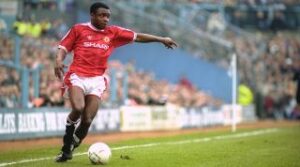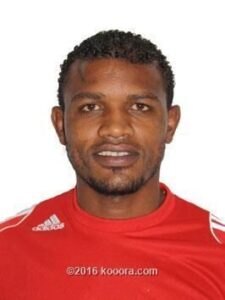Explore about the Famous Soccer Player Paul Parker, who was born in United Kingdom on April 4, 1964. Analyze Paul Parker’s net worth, age, bio, birthday, dating, height-weight, wiki. Investigate who is Paul Parker dating now? Look into this article to know how old is Paul Parker?
Paul Parker Birthday Countdown
Paul Parker Biography
Right back who played for seven teams from 1982 to 1997, and for England’s national team from 1989 to 1994.
He attended Sanders Draper School, where he played soccer.
After retiring he briefly tried managing, and after that, he took up commentary and broadcasting.
He was born and raised in West Ham, London.
He played for England’s team that placed fourth at the 1990 World Cup, led by captain Bryan Robson.
Paul Andrew Parker (born 4 April 1964) is an English former professional footballer, manager, and sports television pundit.
He attended Sanders Draper School in Hornchurch. As a player, he was a full back from 1982 to 1997 most notably with Queens Park Rangers and in that time established a place in England’s World Cup Squad. A transfer to Manchester United ensured wider acclaim and medals but spells with Fulham, Derby County, Sheffield United, Chelsea and Farnborough Town were less successful. He was also a crucial player at the 1990 World Cup with England and earned 19 caps. He had spells as a manager from 2001 to 2005 with Chelmsford City and Welling United.
He had already appeared three times for the England B side, but was racially abused by England’s own fans in a 2–0 win over the Iceland B side in Iceland on 19 May 1989.
His prowess was noticed by England coach Bobby Robson who, establishing he could also play at right back, gave him his international debut against Albania in 1989.
Parker continued to play centrally for his club while deputising for the first-choice Gary Stevens on the right side of defence for country. He was selected as Stevens’ back-up for the 1990 World Cup in Italy but, with Stevens putting in a disappointing display in the opening 1–1 draw with the Republic of Ireland, Parker was put in the team, just five caps into his career.
Parker started his career with Fulham before joining QPR, where he made his name as a nippy and incisive centre back, even though he lacked the height normally associated with his position. During this period, Parker was sold by QPR to Manchester United for £2 million on 8 August 1991, and he made his debut (now as a specialist right back) against Notts County the same month. Parker’s five-year career at Old Trafford began well enough but was eventually blighted frequently by injury and as the club began to dominate the English game under Alex Ferguson, Parker struggled to maintain his fitness.
He won a League Cup winners medal in 1992, a Premiership title medal a year later, and another Premiership title medal and the FA Cup a further year on. The last two years though saw Parker’s inability to stay fit coupled with the emergence of Gary Neville, who ultimately replaced Parker at right back for both club and country.
Parker missed out on almost 18 months of international football but in October 1993 he was called up by Taylor for a vital qualifier for the 1994 World Cup against the Netherlands in Rotterdam. England lost 2–0 and Parker’s hope of reaching a second World Cup were gone.
When Terry Venables took over as England coach in 1994, he called up Parker for his first game in charge – a 1–0 win over Denmark at Wembley but then looked at other right backs, including Jones, before installing Gary Neville as his first choice the following year. Parker’s England career, which had reached such a high four years earlier, was over after just 19 appearances.
Parker missed most of the 1994–95 season through injury, and despite regaining his fitness for the 1995–96, he could not displace Neville and was freed at the end of the campaign. Although United won a second double, he did not play in enough Premier League games for a title medal, and did not feature in the FA Cup Final squad.
Parker then signed for Derby County, who had just been promoted to the Premier League, but could not win a regular first team place and signed for Sheffield United in November 1996. A brief spell back at Fulham, in their Division Three promotion campaign, followed. Later in the 1996–97 season, he played in four games for Chelsea (one start and three substitute appearances) during an injury crisis at Stamford Bridge, although he did not feature in the FA Cup Final triumph that ended Chelsea’s 26-year trophy drought. After ending his professional career he entered the non-League scene with a move to Garry Hill’s Heybridge Swifts.
After retiring from playing, he became manager of Chelmsford City in June 2001. He later managed Welling United.
In 2009, he worked as a coaching consultant and game development officer for Football federation NT.
Paul has ventured into media punditry and was the lead co-commentator with Steve Bower on Setanta Sports’ live Conference National coverage. From 2011, Parker has worked as a pundit on ESPN Star Sports, Astro SuperSport in Malaysia, Mio Stadium and Channel NewsAsia in Singapore. He also writes a blog on Yahoo Eurosport. Besides this, he also travelled to Brazil for the 2014 World Cup to provide media analysis and coverage. This was the first World Cup he has attended since he participated as a player.
Collecting the ball down the right flank, he looked up and sent a high and dangerous ball towards Gary Lineker. The German defenders got in each other’s way and Lineker found room to score with a far post shot. The game ended 1–1 and England departed on penalties. Stevens was recalled for the third-place play off match against Italy but Parker came on as a sub and unfortunately conceded the penalty from which Salvatore Schillaci scored the winning goal. However Parker emerged from the tournament as one of England’s many successes.
With the score at 0–0, the Germans won a free kick just outside the England penalty area early in the second half and as the ball was tapped to Andreas Brehme, Parker sprinted from the defensive wall to try to block the shot. Instead, it clipped off him at such an angle that the ball looped high into the air and swirled round and over goalkeeper Peter Shilton and into the net. The goal was credited to Brehme, but Parker managed to make amends with fewer than ten minutes to play.
What's Paul Parker Net Worth 2024
| Net Worth (2024) | $1 Million (Approx.) |
| Net Worth (2023) | Under Review |
| Net Worth (2022) | Under Review |
| Net Worth (2021) | Under Review |
| Net Worth (2020) | Under Review |
Paul Parker Family
| Father's Name | Not Available |
| Mother's Name | Not Available |
| Siblings | Not Available |
| Spouse | Not Available |
| Childrens | Not Available |






